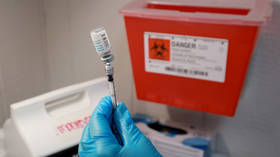‘Traditional values’ will protect Russians from mpox – health regulator

The mpox virus, formerly known as monkeypox, will not spread in Russia, due to the country’s traditional values, the head of consumer health watchdog Rospotrebnadzor, Anna Popova, has said, adding the government has taken all the necessary measures to detect the disease.
The World Health Organization (WHO) declared a global health emergency last week in light of the surge in mpox infections in Africa, calling for a coordinated international response in order to stop the outbreaks and save lives.
“Considering the specifics of how mpox is spread, I am absolutely sure that in Russia with its traditional values this disease, which is an epidemic disease, is not something we need to be afraid of,” Popova said in a video published on Monday by the Telegram channel SHOT.
The virus is transmitted through skin and mucosal contact with an infected person, contaminated materials, or infected animals. According to the WHO, it “primarily affects men who have sex with men.”
On Thursday, Rospotrebnadzor said that there was “no threat of the disease spreading in Russia” and that the government is taking “ all necessary measures to detect the infection ahead of time.” The situation is being constantly monitored, the agency added.
Russia reported its first case of mpox in July 2022 in a man who had returned from Portugal. He was then isolated in the hospital and, according to the health watchdog, the infection was stopped.
According to Popova, there have been three cases overall of mpox in Russia since the disease started spreading globally in 2022. All of those were detected and contained in a timely fashion, she said.
“For Russia this does not present a danger,” she reiterated, adding: “We’re not expecting it (mpox) to spread, it won’t happen.”
The virus has long been endemic in central Africa, mainly in the Democratic Republic of the Congo. When it first began spreading in late 2022, the WHO declared an emergency – and renamed the disease mpox, to avoid any “stigma.”
According to the WHO, more than 14,000 cases and 524 deaths have been reported so far this year, more than the total for the whole of last year.
Scientists say the current strain of mpox is different from what spread in 2022, describing it as more deadly and unaffected by the drug manufactured to fight the 2022-2023 outbreak.
Mpox was first identified as a distinct illness in 1958 among laboratory monkeys in Denmark, while the first documented cases in humans were recorded in 1970 in the Democratic Republic of the Congo, Liberia, and Sierra Leone. The WHO registered the first human case in 1970 in Zaire, now known as DR Congo.












